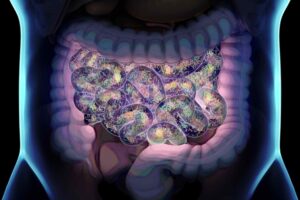gut microbiota
Gastroenterology
Lantibiotic-producing gut bacteria can prolong gut imbalance and increase susceptibility to dangerous infections after antibiotics.
Gastroenterology
MTB and aerolysin drive gut inflammation in ulcerative colitis.
Video, Gastroenterology
William Fusco, gastroenterologist at Policlinico Universitario Agostino Gemelli, highlighted a recently published pilot study on post-infectious irritable bowel syndrome (IBS) framed within microbial precision medicine and biomarker-driven care.
Scientific research
Nutrient competition provides a predictive framework to anticipate and potentially mitigate drug side effects on the gut microbiota.
Endocrinology
The interaction between gut microbes, the amino acid leucine and sIL-6R determines a person’s responsiveness to exercise.
Events, Video
Celine Druart, Executive Director at Pharmabiotic Research Institute, discusses the 10th Pharmabiotics Conference in Brussels, from microbiome biomarkers and One Health to key regulatory developments shaping live biotherapeutic products.
Video
Veronica Ojetti, gastroenterologist at San Carlo di Nancy Hospital (Italy), presents findings from a single-center pilot study assessing the effects of L. reuteri LMG P-27481 on the gut microbiota and…
Neuroscience
Future studies should have clearly defined hypotheses, adequate sample size, standardized protocols, and replication using multiple independent approaches.
Gastroenterology
Changes in gut bacteria raise a child’s chances of developing IBD later in life, offering clues to why the conditions sometimes runs in families.
Gastroenterology
Francesca Ponziani from Gemelli University Hospital (Italy) highlights how the gut microbiota can become a clinical tool for identifying and stratifying patients, clarifying pathogenic mechanisms, and opening up new therapeutic…











